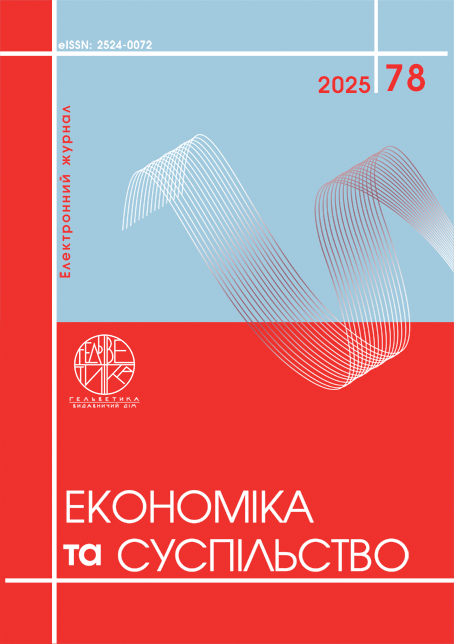STRATEGIC MANAGEMENT OF MEDICAL INSTITUTIONS TO ENSURE THEIR EFFECTIVENESS
Abstract
The article addresses the issue of strategic management of healthcare institutions as a key condition for ensuring their long-term efficiency and resilience in a rapidly changing socio-economic and regulatory environment. The relevance of the topic is determined by the growing complexity of healthcare systems, the increasing demand for quality medical services, and the necessity to adapt to demographic, financial, and technological challenges. The purpose of the study is to conceptualize the theoretical and methodological foundations of strategic management in the healthcare sector, to identify current research trends in this field, and to explore the specific barriers that hinder the effective implementation of strategic management practices in national healthcare institutions. The methodological basis of the research includes a combination of theoretical analysis, bibliometric examination of scientific publications, and critical evaluation of practical challenges in the national context. Special emphasis is placed on analytical and comparative methods for identifying conceptual approaches, on bibliometric methods for structuring the body of scientific knowledge, and on systems analysis for recognizing structural and functional barriers within healthcare institutions. The results highlight several essential aspects. First, the evolution of strategic management theories demonstrates the relevance of combining classical approaches with modern concepts of adaptability and performance orientation in healthcare management. Second, bibliometric analysis reveals an increasing international interest in applying strategic management tools to healthcare systems, while also pointing to thematic gaps requiring further development. Third, the identification of practical barriers emphasizes human resource shortages, limited funding, and imperfect regulatory frameworks as significant obstacles to implementing strategic strategies in healthcare organizations. In addition, the optimization of performance measurement approaches, including the use of key performance indicators, balanced scorecards, and indicators recommended by the World Health Organization, has been shown to increase the effectiveness of strategic decision-making. The practical value of the article lies in the proposed framework for integrating strategic management tools into the activities of healthcare institutions, which can enhance institutional performance, improve the allocation of limited resources, and create a basis for sustainable healthcare development. The findings can serve as a guide for managers and policymakers seeking to strengthen the strategic orientation of healthcare organizations and ensure their long-term efficiency and adaptability.
References
Ansoff I. Corporate Strategy. New York: McGraw Hill, 1965. 248 p.
Drucker P. F. The Practice of Management. Harper & Row, 1954. 107 р.
Porter M. E. Competitive Strategy: Techniques for Analyzing Industries and Competitors. 1980. 41 p.
Мінцберг Г., Куінн Дж., Гослан С. Стратегічний процес: навчальний посібник. Київ, 2011. 688 с.
Barrow D., McInerney R. Management Tools For Creating Government Responsiveness: The Liquor Control Board of Ontario as a Context for Creating Change. P. 27. URL: https://www.innovation.cc/case-studies/barrows-ed.pdf (дата звернення: 10.09.2025).
Beckman S. L., Rosenfielf D. B. Operations Strategy: Competing in the 21st Century. New York: McGraw-Hill Irwin, 2008. 92 р.
Основи законодавства України про охорону здоров’я: Закон України від 19.11.1992 р. № 2801-XII. Відомості Верховної Ради України (ВВР). 1993. № 4. Ст. 19. С. 84.
Вороненко Ю. В. Стратегічне управління в охороні здоров’я: теоретичні та практичні аспекти. Науковий журнал МОЗ України. 2021. № 1 (5). С. 39–41.
Гудкова В., Томчишина Ю. Напрями оптимізації стратегічного розвитку закладів охорони здоров’я в Україні. Збірник наукових праць Державного економіко-технологічного університету транспорту. 2019. № 32. С. 206–214.
Біла В., Сазоненко Л. Головний лікар: менеджер, клініцист чи управлінець? Управління закладом охорони здоров’я. 2019. № 2. С. 42–45.
Global Health Expenditure Database: Statistics and Indicators for 30 Countries. Health Status: Causes of mortality. OECD, 2016. Р. 112. URL: http://stats.oecd.org/index.aspx?DataSetCode=HEALTH_STAT (дата звернення: 12.09.2025).
Ansoff, I. (1965). Corporate strategy. New York: McGraw Hill.
Drucker, P. F. (1954). The practice of management. New York: Harper & Row.
Porter, M. E. (1980). Competitive strategy: Techniques for analyzing industries and competitors. New York: Free Press.
Mintsberh H., Kuinn Dzh., Hoslan S. (2011) Stratehichnyi protses: navchalnyi posibnyk [The Strategic Process: Textbook]. Kyiv: [b.v.], 688 p. (in Ukrainian)
Barrow, D., & McInerney, R. (2005). Management tools for creating government responsiveness: The Liquor Control Board of Ontario as a context for creating change (p. 27). Retrieved from https://www.innovation.cc/case-studies/barrows-ed.pdf
Beckman, S. L., & Rosenfield, D. B. (2008). Operations strategy: Competing in the 21st century. New York: McGraw-Hill Irwin.
Verkhovna Rada of Ukraine (1992) Osnovy zakonodavstva Ukrainy pro okhoronu zdorov’ia: Zakon Ukrainy vid 19.11.1992 № 2801-XII [Fundamentals of the Legislation of Ukraine on Health Care: Law of Ukraine of November 19, 1992 No. 2801-XII]. Vidomosti Verkhovnoi Rady Ukrainy (VVR), 1993, No. 4, Art. 19, p. 84. (in Ukrainian)
Voronenko Yu. V. (2021) Stratehichne upravlinnia v okhoroni zdorov’ia: teoretychni ta praktychni aspekty [Strategic management in health care: theoretical and practical aspects]. Naukovyi zhurnal MOZ Ukrainy – Scientific Journal of the Ministry of Health of Ukraine, no. 1(5), pp. 39–41. (in Ukrainian)
Hudkova V., Tomchyshyna Yu. (2019) Napriamy optymizatsii stratehichnoho rozvytku zakladiv okhorony zdorov’ia v Ukraini [Directions for optimizing the strategic development of health care institutions in Ukraine]. Zbirnyk naukovykh prats Derzhavnoho ekonomiko-tekhnolohichnoho universytetu transportu [Collection of Scientific Works of the State Economic and Technological University of Transport], no. 32, pp. 206–214. (in Ukrainian)
Bila V., Sazonenko L. (2019) Holovnyi likar: menedzher, klinitsyst chy upravlinets? [Chief physician: manager, clinician or administrator?]. Upravlinnia zakladom okhorony zdorov’ia [Health Care Institution Management], no. 2, pp. 42–45. (in Ukrainian)
OECD. (2016). Global Health Expenditure Database: Statistics and indicators for 30 countries. Health status: Causes of mortality (p. 112). Retrieved from http://stats.oecd.org/index.aspx?DataSetCode=HEALTH_STAT


